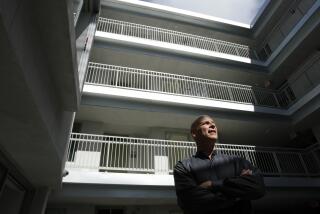HomeClub Plans Public Stock Offer to Raise $40 Million for Expansion
HomeClub Inc., a rapidly growing chain of discount home-improvement stores that already has raised more than $30 million in private capital, will make a public stock offering in hopes of raising about $40 million to finance further expansion, company officials said.
To fuel a growth plan that calls for 30 new stores in two years, the company wants to make the public offering by the end of the year, said George Handgis, 33, executive vice president and co-founder of the fledgling firm, which moved its administrative offices from Long Beach to Fullerton in February.
HomeClub, the latest entry in the highly competitive home-improvements market, introduced to California the concept of combining bulk purchasing with bare-bones retailing to produce deep cuts in consumer prices. Several analysts said the company is responsible for a new round of price-cutting throughout Southern California’s home-improvements industry.
Handgis said the company’s fund-raising plans are still tentative, and that HomeClub has not chosen an underwriter or determined the exact size of the stock offering. John Shanklin, HomeClub’s chief financial officer, said the goal is to raise about $40 million.
Expanded to Six Outlets
HomeClub began business in October, 1983, using $4.5 million in venture capital to open two retail warehouses in Norwalk and Fountain Valley. Since then, outlets in Las Vegas, San Jose, San Bernardino and Fullerton have been added.
Despite its youth, HomeClub’s entry has heated up an already competitive field in Southern California. Its arrival has prompted Ole’s Home Centers, National Lumber and Builders Emporium to cut their prices, said Brad Altman, west coast editor of the trade paper National Home Center News.
Altman said the older home-center chains are “scrambling to redefine their message and mission, and (that has been) all pretty much precipitated by the arrival of HomeClub.”
HomeClub’s formula is to sell directly from its 100,000-square-foot warehouses, which are stocked with lumber, tools, plumbing equipment and other home-improvement goods purchased in huge lots at bulk prices.
No-Frills Merchandising
Customers vy with forklifts for space in the warehouse aisles. Club members pay a $15 annual fee to avoid the 5% surcharge non-members must pay on their purchases.
HomeClub never has sales, but strives to undercut its competition on a daily basis. Handgis said this is accomplished, in large part, by using a computerized inventory system and keeping advertising costs at a minimum. To push its wares, the company does mass mailings largely aimed at HomeClub members--a group whose size is kept confidential.
Home improvement industry analysts, as well as some of HomeClub’s competitors, say the company also holds down its overhead by stocking a narrower selection of merchandise and offering fewer services than more conventional stores. HomeClub officials dispute that, but nonetheless concede they don’t sell as many lower-quality imported goods as their competitors.
HomeClub officials admit they take a lower-than-average gross profit margin on their merchandise, 19%, compared with 27% to 35% among their competitors. That translates into a 15% to 40% price savings for HomeClub members and customers, they say.
Method Showing Profits
It also appears to be translating into profits for HomeClub. The company lost $1.7 million in 1984, its first full year of operation, but expects to earn from $5 million to $6 million this year on sales of $250 million, according to Shanklin.
He blamed the 1984 loss on the cost of starting so many new stores, but said the expansion costs expected this year will be exceeded by profits from the present stores.
By the end of this year, Handgis said, HomeClub plans to open 15 more outlets, some in the Los Angeles basin and some in Northern California. The current expansion is being financed from the proceeds of a $30.8-million private placement of HomeClub stock that was completed in November.
Money raised from a public stock offering, said Handgis, would be used to add another 15 stores in 1986, and to begin moving East, with the goal of eventually becoming a nationwide chain.
HomeClub’s fortunes may be boosted, retail analysts say, by the fact that home improvement centers currently are the nation’s fastest-growing retail sector.
Entrepreneur’s Field
“It’s still the only place an entrepreneur can start from scratch and make a killing,” said Altman, the trade paper editor.
Robert Roth, a vice president and merchandising analyst for Merrill Lynch, Pierce, Fenner & Smith, said the outlook for home improvement centers is brightened by an increased number of people in the 25-to-44 age group and the rising cost of contract labor, which has prompted more “do-it-yourself” projects.
Nonetheless, he said, the home improvement industry showed itself to be riskier than once thought when it suffered a setback during the recent economic recession. And he noted that the competition among retail home improvement companies is intense, especially in California.
Competition is expected to get stiffer for HomeClub this summer, when The Home Depot Inc., an Atlanta-based company that pioneered the discount warehouse concept of home-improvement centers, plans to move into California.
Danford Hand, retail analyst for the Los Angeles office of Scudder, Stevens & Clark, said Home Depot intends to open several outlets in Orange County, including one in Huntington Beach and one in Fullerton. Hand called Home Depot “the most successful warehouse chain in America.”
Claim Lowest Prices
But HomeClub chairman Robert J. McNulty, who founded the company with Handgis, shrugs off the Home Depot threat by saying his firm offers lower prices.
HomeClub’s management maintains a determined air of confidence as officers discuss the company’s growth plans.
Last year, in its first full year of operation, HomeClub posted a loss of $1.7 million, a loss Shanklin blamed on start-up costs. But since last November, he said, the company “has been operating in the black and the trend has been upward.”
Investors demonstrated confidence in HomeClub’s future last October, when the company decided to make a private offer of its stock. Cornelius C. Bond Jr., a HomeClub director, warned that the company would have difficulty raising its goal of $10 million.
Instead, in what turned out to be one of the largest financing deals of 1984, HomeClub raised $30 million and turned down $15 million, because it had no use for the extra money.
More to Read
Inside the business of entertainment
The Wide Shot brings you news, analysis and insights on everything from streaming wars to production — and what it all means for the future.
You may occasionally receive promotional content from the Los Angeles Times.










